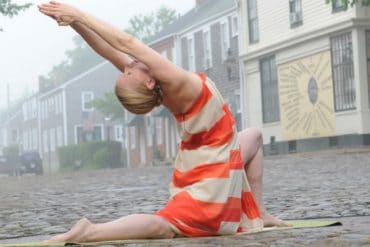CEO Gary Shaw takes the helm of the Nantucket Cottage Hospital amid stormy seas.
When Gary Shaw arrived for his first day on the job as the new CEO of the Nantucket Cottage Hospital this winter, he was walking into a good situation. The hospital had just completed a herculean construction campaign that delivered the island the most sophisticated and well-equipped facility of its kind in the country. Shaw had come out of retirement to take the position, having previously served as president or CEO for a number of hospitals and healthcare providers around the country. Prior to that, he spent twenty years in the United States Navy, serving as a lieutenant commander in the Medical Service Corps assigned to hospitals and ambulatory clinics in the United States, Asia, Caribbean and Europe as well as with NATO peacekeeping forces. After the coronavirus pandemic hit the United States, Shaw drew from his years of experience to lead the Nantucket Cottage Hospital with calm decisiveness and military efficiency.
N MAGAZINE: What past experience are you bringing to Nantucket that is shaping how you are managing the coronavirus?
SHAW: I bring a former public health perspective and an understanding of how disease can be transmitted and how to prevent that once you’ve identified what you’re dealing with. I bring organizational skills that were honed in the military. I understand all of the personal protective measures that need to be put into place to protect individuals and workers. Part of my work in the Navy was in industrial hygiene, where we looked at everything that people are exposed to in the workplace—whether it’s biological hazards, lasers, chemicals, mist fumes, vapors, sound or light— and created environments that are safe and minimize risk. When you have a background working in the safety and prevention arena, it bodes well for situations such as this. You stand up, you lean into it, you dust off your old skills and then you put to work what you’ve learned over a lifetime.
N MAGAZINE: What is your biggest fear about COVID-19 on the island?
SHAW: My biggest fear is having a large pool of virus circulating within the population that’s not checked from growth because of a lack of de-socializing. My fear is that if we don’t break the chain of transmission, you have unchecked growth and development of a virus that has shown to be extremely communicable and that we know certain age populations are highly vulnerable to. Data is starting to evolve that shows that even healthy people are starting to have difficulty surviving the coronavirus. So my worry is that we could have a number of cases that could rapidly overwhelm our health system here on Nantucket. That is my biggest fear.
 N MAGAZINE: Has the virus mutated in a way that it’s affecting young people in serious ways?
N MAGAZINE: Has the virus mutated in a way that it’s affecting young people in serious ways?
SHAW: I’m not reading anything that says the virus has changed. What’s fascinating is the fact that it hasn’t really changed. What we do know is that it started circulating in one culture and moved to another culture. We’re starting to see people of different cultures have different impacts. I don’t know if it’s related to culture, but as it gets to different countries, it seems to present in different or broader ways. I think we’ll learn over time what that means and the significance of it as we see a case load. But it isn’t mutating, as I read about it today, which is promising for chemical control or vaccine control in the future. If it’s not going to be mutating like the flu does, it might be able to be controlled or eliminated.
N MAGAZINE: Will the coronavirus become an annual occurrence like the flu?
SHAW: It’s my understanding that different types of coronaviruses have been in play for many years. This is one of an array of coronaviruses that has emerged. Flu is never actually gone. It circulates in the tropic belts year-round. As such, we study it to determine how it’s shifting to try to predict how to drive a vaccine to prevent broad infection. Sometimes we get it right, sometimes we get a percentage of it right, but that’s how flu behaves. We haven’t yet seen whether there’s an attrition to the coronavirus that would be more impactful in the Northern Hemisphere or subtropical climate than the tropical. More to come on that, but it’s just too new to know.
N MAGAZINE: When will we know when we’re out of the woods on this?
SHAW: Unfortunately, we’re at a point where we have so many vulnerable people facing a disease that can be transmitted pretty easily. The goal is to not have a spike in a population, which then creates such a surge of cases that it overwhelms medical capacities and the community’s ability to deal with it. We’re trying to knock it down by social distancing and taking actions that keep us physically apart from one another and those who are most at risk. So if we knock it down, we’ll see it circulating in the population a little longer, but in probably fewer places. We can then control its outbreak and give us time to get a vaccine in place. Right now, we’re trying to buy time to knock it down, focus on vaccine development and learn if it’s receptive to any of the other drugs that have been used for Ebola or the other types of viruses that have emerged. So we’re buying time. We don’t see a short-term out in this. It’s more of a long-term play.
N MAGAZINE: People are wondering whether Nantucket’s summer will be canceled. Do you care to hazard a guess as to what the summer holds?
SHAW: That takes a crystal ball at this point. I don’t have the right answer. We know that right now we do have a circulating pool of virus. We have a slow rise in cases. We expect more. I think we’re in the honeymoon phase of understanding this virus. Our hope is that by asking for the social distancing early enough, we minimize the spread and we’re going to see a focus of cases. The goal would be to find cases, but fewer than in other parts of the country, and then to see the virus go back down to a low level and possibly disappear. I can’t put a crystal ball to how the officials of Nantucket will want to handle moving into the springtime and summer, other than to know that the town is doing its best and we are playing our part in supporting the community to try and minimize the impact here.
N MAGAZINE: How important are the new facility and the new equipment to helping support your efforts?
SHAW: When you go from older to new, you increase the capability of limiting disease spread. There’s a whole host of upgrades that bring us up to an ultra-modern age, the best that money can buy. We’re very well equipped. Our laboratory is state of the art. With our connection with Partners and how we share resources back and forth, it’s the best support connection you could ever have in the world. So we’re extremely well positioned to weather what we have here. My only worry is that even a facility can’t protect you from individual transmission. If we have any breakthroughs in handwashing or use of personal protective gear, then we have to look at how we isolate and protect in order to keep our services going. The big goal is to put to work all of our high-tech equipment. It can help guide us through what we are facing. Personal protective gear helps us prevent infection and transmission of this virus. And then communicable control, within the community through the public health department, checks the spread of disease so it doesn’t overwhelm the population, which could potentially overwhelm the hospital. So I think we’re really well positioned.
 N MAGAZINE: We’re coming to realize the needs of hospitals around the country, whether it be ventilators or medical masks. Are there any needs that are unique to the Nantucket Cottage Hospital from the rest of the country?
N MAGAZINE: We’re coming to realize the needs of hospitals around the country, whether it be ventilators or medical masks. Are there any needs that are unique to the Nantucket Cottage Hospital from the rest of the country?
SHAW: Staff. Our challenge is that we have a spring and a fall fluctuating population. The virus chose to pick us when we had the least amount of people here and also when we had the least amount of staff resources. So when we look at what our needs are, our needs are to be able to keep the staffing in our departments whole, our nursing staff whole, our operating rooms going and our emergency room open.
N MAGAZINE: This is a baptism by fire for you and your staff that you’re just getting to know. What are your impressions of the people around you?
SHAW: We have a fantastic team of leaders who are extremely proactive. Nantucket is their home. They see their friends, their elderly folks, their coworkers all impacted. Nobody wants to see this happening to anybody in the community. There are extremely well-trained people focused sharply on this issue. I’m working with the best of the best. When a crisis starts to emerge, the stars become superstars. The people doing the day to day become the new stars. Folks are working way beyond their normal hours because they want to do everything they can to protect their community. It’s quite an honor to be beside these folks who are performing miracles every day. And the community itself is stepping up. I have to say that I have never seen a community step in to meet a hospital’s request for help like I have on Nantucket.
N MAGAZINE: People in the community want to help, but it seems like the best way to help is for them to stay in their homes. Are there any other ways Nantucketers can support the hospital?
SHAW: Stay in your homes. Listen for information. Keep yourself aware of what’s going on. Listen to your town officials related to their expectations to help you be safe. This is a public safety issue; this is a public safety time. So we here at the hospital will be putting on a number of videos, we’ll be on the radio station, we’re in print. Our website will continue to evolve with all the current information that we have. Stay away from hype. Focus on the facts. I think that’s the best way to be prepared and go through a daily routine.
 N MAGAZINE: You made a call to the community for retired physicians to come out of retirement. How have people responded?
N MAGAZINE: You made a call to the community for retired physicians to come out of retirement. How have people responded?
SHAW: We’ve had over fourteen individuals call, indicating that they could do different things. Not all can go into practice, but they’re all willing to pick up telephones and do contact tracing, or help in different ways. So we’re reviewing where those needs are now, but it’s been a fantastic response.
N MAGAZINE: The infection rate is dropping because people are staying at home. Conversely, will the rate increase when people start to normalize? Is vaccine the only real solution?
SHAW: Until there is a medication, a vaccine or herd immunity, we will need to keep the curve flat by distancing, handwashing, wearing a mask and praying for medicine. This is not one and done.
N MAGAZINE: Are there any other words of wisdom you’d like to share with the community?
SHAW: When you face adversity in life, make the choice to lean into it and make the best of the situation that you can. That will develop your mettle and guide you well for the rest of your life. We’re doing that on Nantucket, and we’re going to come out of this showing that we are the best of the best.








